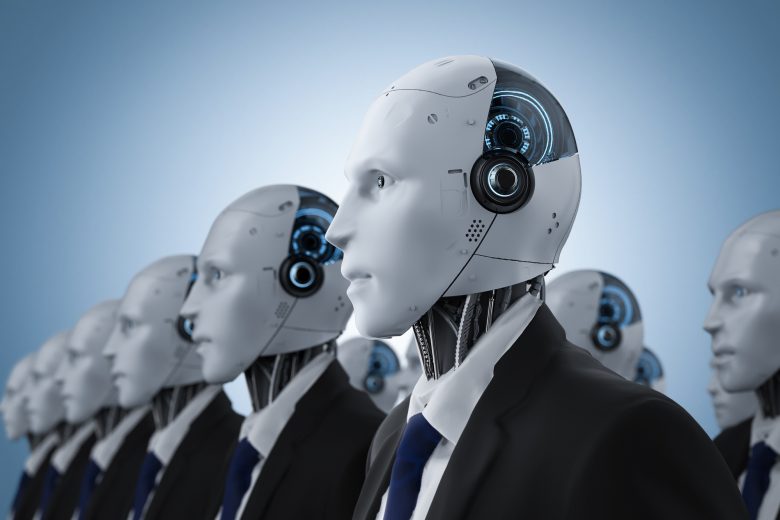Recently, there has been an increased reliance on technology to do jobs previously done by humans. During the last decade, we’ve seen customer service, food preparation, and factory workers replaced by technology. The pandemic of 2020 accelerated the need for automation due to the need to limit human contact.
But it looks like that trend isn’t slowing down anytime soon. Experts estimate that AI could take the jobs of as many as one billion people globally and make 375 million jobs obsolete over the next decade. By 2030, 45 million Americans could lose their jobs to AI automation, representing about one-quarter of the workforce. Some counter these statistics by emphasizing that AI will also create many jobs.
The assumption has always been that AI and robots would replace labor-intensive, boring, and repetitive jobs. But, as technology continues to advance, we are beginning to witness many white high-level jobs experience what is being called “white-collar automation”.
In this article, we will be looking at 7 white-collar jobs that could soon be replaced by AI and robots.
What is White Collar Automation?
White-collar automation is when higher-level human jobs that require more intelligence and understanding are replaced by AI. What was once seen as impossible, is now seen as inevitable for many professions.
Although it seems as though AI will take away much of the work done by humans, in many of these professions, people will still be necessary for the work to be done properly. In some cases, if humans are not involved, the risk to human lives increases.
Let’s take a look at a few of these jobs and their trend towards automation.
1. Medical Staff
A competent medical staff is one of the hardest groups of people to replace with technology. However, there are many aspects of medical care such as data analysis, technical expertise, and medical knowledge that could be outsourced to robots without any negative effects. Robots such as the aptly named Da Vinci can now perform laparoscopic surgeries, while software can provide a highly objective and accurate diagnosis of patients given their symptoms.
Even so, there are aspects of medical care such as interpretation of incomplete patient data, ethics, and human psychology that simply cannot be done by machines. It is one thing putting data analysis and technical interpretation in the hands of robots.
Putting the life of a human into the hands of a robot that does not have any legal or moral obligations would have many legal and ethical implications. This means that some medical staff may still be necessary.
2. Pilots
When it comes to white-collar jobs and robots, no industry epitomizes automation more than aviation. Aviation has come a long way from the days when Lindberg stayed for thirty-three and a half hours flying a plane from the controls. With so many non-rewarding and repetitive tasks in the plane’s cockpit, automation has made pilots’ jobs easier.
The recent development of a robot named the Aircrew Labor In-Cockpit Automation System (ALIAS) that can do practically all that a human pilot can in the cockpit makes the case that soon robots may replace pilots. As recently as 2021, the DARPA Aircrew Labor In-Cockpit Automation System program completed a first ever flight of a UH-60A Black Hawk helicopter without anyone onboard.
Nevertheless, while robots now perform so many aviation tasks, the pilot still has an important role to play in monitoring controls and flying the plane in times of crisis.
Pilots have proved time and again to be superior to robots in times of aviation crises. Even though a plane can fly itself, you still need pilots to monitor the controls and take over the flying of the plane in case the robots malfunction.
3. Attorneys
Whereas many people consider attorneys to be nothing more than robots that regurgitate legal concepts, it will be a long time before robots can replace humans in the legal profession. Despite the fact most laws are static, their interpretation is not.
However, a chatbot called DoNotPay designed by a teenager is taking London and New York by storm after it was able to overturn parking tickets. Dubbed the ‘robot lawyer’, the chatbot is meant to help motorists dispute parking violations in half a minute.
The success of the robot lawyer is overwhelming as it has successfully canceled 160,000 fines for parking violations since its launch last year, 2015.
While you can automate aspects such as legal research and record-keeping, it is more difficult to automate interpretation as different attorneys will interpret and argue cases differently.
4. Judges
Judges have never been much in the conversation in discussions about white-collar jobs and robots. However, Rapid developments in technology, particularly in artificial intelligence (AI) have led to predictions that robots could replace judges in the next twenty years. Just recently, artificial intelligence software put to the test in simulated conditions performed reasonably well.
The software devised by University College London computer scientists was able to deliver the correct outcome in 79% of the cases by analyzing English language data sets that were composed of over 500 cases.
Founder of Hack Future Lab, Terence Mauri, also believes that judges will be replaced by AI in the future. According to Mauri robotic judges should replace humans in several areas of criminal and civil law in the UK by 2070: “Hearings will be quicker, and the innocent will be far less likely to be convicted of a crime they did not commit.”, Marui says.
Nonetheless, the catch is that you would still need human judges to have made the decisions in the past. Moreover, robotic systems cannot make precedent-setting judgments or make valid rulings on cases that do not have sufficient precedent, thus necessitating the input of human judges.
5. Financial Advisors
Robots are taking over the financial advice segment ever more rapidly. Known as Robo Advisers, these investment advisory services may include either fully automated financial investment advice from computers or advice from a hybrid that is composed of human advisers in collaboration with computerized systems.
Financial investment advisory services have lately been making moves to make robot advisers more appealing. An investor opting for Robot advisers now pays lower fees than when they decide to go for a human financial adviser. The advantage of Robo advisers is that they are not only cheaper but are also less likely to make cognitive mistakes given their lack of emotion and cognitive bias.
Upstarts such as Wealthfront and Betterment as well as established firms like Vanguard, Charles Schwab, and Wells Fargo have Robo advisory platforms that are striking fear into the hearts of many seasoned Financial Advisors.
Most firms will likely maintain some human financial advisers. Betterment, for example, provides Financial Consultants for individuals investing $250,000 or more. The ideal scenario would be having a hybrid of human and automated systems and fully passive machine systems.
6. Accountants
Accounting software has been a mainstay in the accounting industry for decades now. However, innovations are making software more consumer-friendly and easier to use. What this means is that more people, including small businesses and startups, will shift to the use of accounting software rather than employ expensive human accountants.
Nevertheless, the transition to DIY accounting solutions such as TurboTax and Freshbooks is highly unlikely to happen overnight. Furthermore, accounting tasks that require mastery of tax law, interpretive insight rather than mathematical acumen, communication, creativity, and trust are better performed by human accountants. On the other hand, likely, highly repetitive tasks such as document processing and mathematical calculations will increasingly be the realm of robots.
7. Reporters
When you think of white-collar jobs and robots, the group most people believe are least vulnerable are reporters. The work performed by reporters is deemed impossible to automate since it involves the reporter visiting the scene of a story and reporting what they see. However, over the past few years, major news corporations such as Forbes have been running human-readable content written by machines. The New York Times, Associated Press, Reuters, Washington Post, and Yahoo! Sports have also been known to use AI to generate content. And roughly a third of the content published by Bloomberg News uses some form of automated technology. News stories that are highly data-oriented such as sports and finance seem to be easier to write for robots.
Still, stories that require aspects such as emotion and human perspectives can never be outsourced to robotic machines. As such, while we will see robots writing more news stories in the future, the news reporter is highly unlikely to be completely phased out soon.
Conclusion
I ordered a meal from McDonald’s the other day. It had been a while since I visited the restaurant. Partially because I was on a 10 month diet where McNuggets were forbidden. But since I broke free from the chains of the carb-free diet, I suddenly wanted to make up for lost time by enjoying a meal from my childhood.
When I walked into the restaurant doors I was greeted by an employee that welcomed me and walked me over to a order kios.
While I was eating my food, I began to think about how seamlessly bots and technology are replacing humans in the service industry and entry level positions such as the young lady that walked me over to the kios where I placed my order.
But what about other positions in the workforce? Could occupations that require years of experience and a high level of education be replaced as well?
This article was first published in November 7, 2016 but has been updated and expanded to include updated information for 2022















Pingback: White Collar Recession: What It Is and Why It Matters | Biz Builder Mike
Pingback: White Collar Recession: What It Is and Why It Matters - StartUp Mindset
Pingback: Fascinating Methods & Tactics That Can Help Your Internet Venture Grow ·
Pingback: 7 White Collar Jobs that Could Soon Be Replaced by Bots – Small Business
Pingback: Will A.I. Complement Future Businesses or Make Their Employees Obsolete? - StartUp Mindset
Pingback: Why you Should Take Business Personally
Pingback: Why you Should Take Business Personally - StartUp Mindset